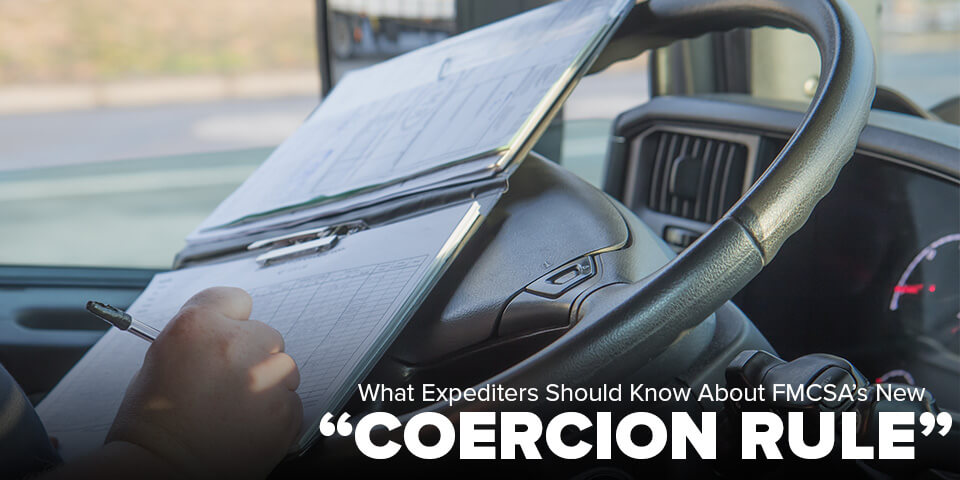In The News

How will the new Coercion Rule affect your business?
On November 30, 2015, the U.S. Department of Transportation's Federal Motor Carrier Safety Administration (FMCSA) issued a final rule, effective January 29, that protects truck drivers from coercion by motor carriers and third-party logistics firms to violate hours-of-service and other commercial vehicle regulations.
Said FMCSA acting administrator Scott Darling in the agency's announcement: "Any time a motor carrier, shipper, receiver, freight-forwarder, or broker demands that a schedule be met, one that the driver says would be impossible without violating hours-of-service restrictions or other safety regulations, that is coercion. No commercial driver should ever feel compelled to bypass important federal safety regulations and potentially endanger the lives of all travelers on the road."
So, how will this new "coercion rule" impact your business as an expedite owner-operator? EO has put together a cheat sheet to give you the high-level points you need to know.
What constitutes "coercion"?
FMCSA defines coercion as what "occurs when a motor carrier, shipper, receiver, or transportation intermediary threatens to withhold work from, take employment action against, or punish a driver for refusing to operate in violation of certain provisions of the the Federal Motor Carrier Safety Regulations (FMCSRs), Hazardous Materials Regulations (HMRs) and the Federal Motor Carrier Commercial Regulations (FMCCRs)."
How do you determine whether coercion has occurred? FMCSA outlines these three points:
- "A motor carrier, shipper, receiver, or transportation intermediary request a driver to perform a task that would result in the driver violating certain provisions of the FMCSRs, HMRs, or the FMCCRs;
- The driver informs the motor carrier shipper, receiver, or transportation intermediary of the violation that would occur if the task is performed, such as driving over the hours of service limits or creating unsafe driving conditions; and
- The motor carrier shipper, receiver, or transportation intermediary make a threat or take action against the driver's employment or work opportunities to get the driver to perform the requested task."
In a nutshell, these three things must happen to consider the incident coercion. First, you must be asked by the carrier or third-party to do something that will violate federal rules. Second, you are to tell that person that, if you perform the task, you would be breaking the rules, which you refuse to do. If the person retaliates for your refusal, then he or she is coercing you. It's this last point -- the threat or action of retaliation -- that ultimately turns an ill-advised request into coercion.
How do you report an incident?
FMCSA says that coercion complaints must be filed within 90 days of the alleged incident by contacting the Division Office located in the state where you're employed or the National Consumer Complaint Database. The agency recommends supporting your claim with the following information:
- "Any written exchange, such as text message or email exchange between parties requesting you to violate rules, and your response to the request.
- Names of individuals that witnessed the coercion attempt."
Says FMCSA: "It will be sufficient, for example, if the driver indicates that he or she objects to a particular trip because of an HOS problem ('they told me to keep driving even when I hit 11 hours'), a maintenance issue ('the last inspection certificate was three years old'), or bad tires ('there was no tread on the front tires; I could see the ply in a couple of places'). Similarly, the Agency will not require the driver to record his objection in 'a contemporaneous writing.' On the other hand, if the shipper or transportation intermediary attempts to coerce the driver to take the load after hearing the objection, it would be in the driver's best interests to document that attempt as soon as practicable."
Will your information be kept confidential?
Yes ... and no.
The rule says, "FMCSA is required by 49 U.S.C. 31143(b) to keep the identity of a complainant confidential unless 'disclosure is necessary to prosecute a violation.' Because a party accused of coercion cannot defend itself without knowing the name of the accuser, and when and where the alleged incident occurred, the driver's identity cannot be confidential."
In other words, your identity will remain confidential until the agency determines it has a case. At which point, FMCSA will need to disclose your identity to prosecute the case.
What are the penalties for violators?
Penalties include fines up to $16,000, and FMCSA may initiate "a proceeding to revoke the operating authority of a for-hire motor carrier.
But, as a driver, don't expect to receive compensation for being a victim of coercion. The ruling says, "The Agency cannot pay drivers the civil penalties it collects for incidents of coercion. And unlike OSHA, FMCSA has no authority to require the violator to compensate the driver for injuries he or she has suffered."
The Key Takeaway
If you feel pressured by anyone in the logistics supply chain to get or stay on the road when you think it's unsafe or would violate federal regulations, then you have the right (and responsibility) to stand your ground and report that incident of coercion, without fear of retaliation. But you must speak up. If you give in to the coercion, you will be held responsible for any rules violations.
Dig Deeper
Want to learn more? Check out these resources:
DOT's Official Announcement of Final Rule
